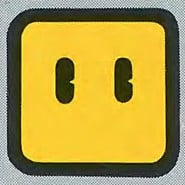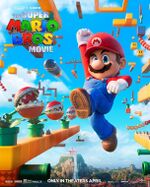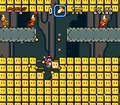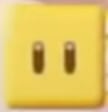Rotating Block
- Not to be confused with rotating platform.
| Rotating Block | |
|---|---|
 Artwork from Super Mario World | |
| First appearance | Super Mario World (1990) |
| Latest appearance | Super Mario Bros. Wonder (2023) |
| Effect | Spins around when hit |
Rotating Blocks,[1] also known as Spinning Blocks,[2] Turn Blocks,[3] or simply Blocks, are yellow blocks with eyes that first appear in Super Mario World. When hit from below or the sides, they briefly spin around, allowing Mario or other characters to pass through them.
History[edit]
Super Mario series[edit]
Super Mario World[edit]
Rotating Blocks are objects in Super Mario World. They replace bricks from previous entries of the Super Mario series and share most of their attributes with them. Normal Rotating Blocks spin around for a short time when hit from beneath or attacked as Caped Mario (or Caped Luigi), but some act as Prize Blocks and reveal an item. Super Mario can destroy normal Rotating Blocks with a Spin Jump from above. Chargin' Chucks can also destroy Rotating Blocks by charging into them. Also, enemies such as Koopa Troopas and Goombas may hide in Rotating Blocks, and break out to attack Mario once he approaches them. Only a maximum of four Rotating Blocks may be spinning at any given moment.
Super Mario Maker / Super Mario Maker for Nintendo 3DS / Super Mario Maker 2[edit]
Rotating Blocks appear under the name Block in Super Mario Maker, Super Mario Maker for Nintendo 3DS, and Super Mario Maker 2. Rotating Blocks replace Brick Blocks (themselves simply called "Blocks") in the Super Mario World style. To be consistent with the other styles, these Blocks are affected by P Switches instead of Empty Blocks, unlike in the original game. In Super Mario Maker 2, if the player presses a P Switch, any Ice Blocks with a coin frozen inside temporarily become frozen versions of these Blocks (resembling the Ice Blocks' design from the original Super Mario World). However, when hit from below or the sides, they do not spin.
In the Japanese script, these Blocks are referred to as "Renga Block" (Brick Block) along with the Brick Blocks themselves despite being functionally distinct from each other.
Super Mario Bros. Wonder[edit]
Rotating Blocks are objects in Super Mario Bros. Wonder, where they can no longer be broken using a Spin Jump. They appear in Pipe-Rock Plateau Palace and Color-Switch Dungeon. Wider Rotating Blocks similar to Long ? Blocks also appear in Pipe-Rock Plateau Palace and Taily's Toxic Pond.
Super Smash Bros. series[edit]
- SmashWiki article: Block § Rotating Blocks
Turn Blocks appear in the Super Smash Bros. series in Melee's Yoshi's Island stage (in Super Smash Bros. Melee, Super Smash Bros. Brawl, Super Smash Bros. for Wii U, and Super Smash Bros. Ultimate) and in the Super Mario World style of the Super Mario Maker stage (in Super Smash Bros. for Nintendo 3DS / Wii U as DLC, and Super Smash Bros. Ultimate), working as they originally did, though they are 3D in Yoshi's Island (they turn 2D when rotating). Unlike in Super Mario World, when hit, the Rotating Blocks spin at a fast speed before slowing down, as opposed to spinning at a steady pace, and also spin individually, instead of them spinning in unison.
Mario Sports Superstars[edit]
The dummies that appear in the Ring Challenge mode of the soccer sport in Mario Sports Superstars resemble Rotating Blocks. When struck by a ball, they flip sideways revealing their back side resembles Empty Blocks in their design from Super Mario World.
The Super Mario Bros. Movie[edit]

A poster for The Super Mario Bros. Movie of Mario on the Training Course features some Rotating Blocks in the background. In the movie itself, Rotating Blocks are scattered all around the Training Course among Brick Blocks and Empty Blocks. When Mario or Princess Peach wall-jumps off them, they light up.
Other appearances[edit]
The tiles from Super Mario RPG: Legend of the Seven Stars, Yellow Blocks from Paper Mario, and Bike Pads from Mario & Luigi: Superstar Saga resemble Rotating Blocks.
Although actual Rotating Blocks do not appear in Mini Mario & Friends: amiibo Challenge, there are blocks that have an identical design, primarily found in Mini Luigi's world, Moonlight Mansion. They initially appear as transparent Brown Blocks from Super Mario World, referred to as invisible blocks,[4] but they turn solid and yellow when a nearby candle is lit, allowing the Minis to walk on them.
Profiles[edit]
Super Mario World: Super Mario Advance 2[edit]
- European instruction manual description: Hit these blocks to make them spin for a fixed amount of time.
See also[edit]
Gallery[edit]
Names in other languages[edit]
| Language | Name | Meaning | Notes |
|---|---|---|---|
| Japanese | クルクルブロック[5] Kurukuru Burokku |
Spinning Block | |
| French | Bloc pivotant[?] | Rotating Block | |
| Bloc[?] | Block | Super Mario Maker 2 | |
| German | Rotierender Block[6] | Rotating block | |
| Italian | Blocco girevole[?] | Spinning block | |
| Mattone girevole[6] | Spinning brick | ||
| Portuguese (NOA) | Bloco Giratório[7] | Spinning Block | |
| Portuguese (NOE) | Bloco Rotativo[?] | Rotating Block | Super Smash Bros. for Wii U tips |
| Spanish | Bloque giratorio[8] | Spinning block |
References[edit]
- ^ 2002. Super Mario World: Super Mario Advance 2 instruction booklet. Nintendo of America (American English). Page 19.
- ^ August 1991. Nintendo Mario Mania Player's Guide. Nintendo of America (American English). Page 57.
- ^ von Esmarch, Nick, and Reepal Parbhoo (November 21, 2014). Super Smash Bros. for Nintendo 3DS/Wii U Prima Official Game Guide. Prima Games (American English). ISBN 978-0-804-16356-9. Page 233.
- ^ "The candle in this contraption scares Ghosts into covering their eyes, so you can safely walk your Mini right through them. You’ll also be able to see invisible blocks, which may help you reach new places." – Mini Mario & Friends: amiibo Challenge Items. Play Nintendo (American English). Retrieved April 6, 2020.
- ^ Super Mario World Japanese instruction booklet (fold-out)
- ^ a b Super Mario Advance 2: Super Mario World European instruction booklet[page number needed]
- ^ Super Mario World instruction booklet. Nintendo (Brazilian Portuguese). Page 22.
- ^ Super Mario World: Super Mario Advance 2 Spanish instruction booklet[page number needed]
- Blocks
- Mini Mario & Friends: amiibo Challenge objects
- Super Mario Advance 4: Super Mario Bros. 3 objects
- Super Mario Bros. Wonder objects
- Super Mario Maker objects
- Super Mario Maker 2 objects
- Super Mario World objects
- Super Princess Peach objects
- Super Smash Bros. Melee
- Super Smash Bros. for Nintendo 3DS / Wii U
- Super Smash Bros. series objects
- The Super Mario Bros. Movie objects




